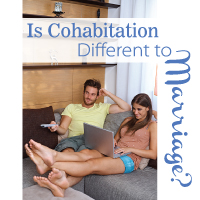Is Cohabitation Different to Marriage?

Is cohabitation different to marriage? Lots of cohabitors will say ‘no’. We regularly hear comments to the effect: “We’ve been living together for 5 years – we’re just as committed as any married couple!” They seem offended by the suggestion that couples in marriage would be seen as more committed than they are.
We recall one particular conversation we had a number of years ago with a young man in his late twenties. He’d been with his girlfriend for seven years, living together for over five years. Predictably, she’d been putting the pressure on to ‘commit’ to marriage. He was dodging the issue. So we quizzed him a bit. He’d had plenty of time get to know her? Yes – she’s great. Was he financially stable? Yes – no worries there. No addictions, mental illnesses, personality disorders? No – all good there. So why are you waiting…? “Because what if there’s someone else out there”.
We batted that one right back: “Dave, you’re still on the market! All these years, you’ve been telling Kylie that you’re 100% for her, but in truth, you’re waiting for a better offer. Is that really fair to her? If you love her, marry her, but if you don’t, stop stringing her along”.
Poor fellow, it was a real wake-up call for him as the realisation suddenly dawned on him. He was a great guy and he wasn’t consciously playing her, it was just that there had never been a need to make a real commitment and so he hadn’t. To be clear it wasn’t that he had committed in practice but not articulated… he hadn’t committed… and she knew it and that’s why she was pressing the marriage question.
So this leads us to ask… Are cohabitating couples really as committed as married couples? To be fair, there are some married couples who treat their vows so flippantly that it makes the family dog look like a commitment die-hard. Look no further than the line-up of celebrity first-year bust ups. Equally so, there are no doubt some cohabitating couples who have made explicit, though private, vows to love each other in sickness and health, poverty and wealth, better and worse, for the rest of their lives… but let’s be honest these are the rare exceptions, and if they’re going to go to the trouble to draw up such a contract, well we’ve got a name for that: marriage.
The thing about cohabitation is, that by large, the VAST majority of couples don’t want to commit fully the way marriage vows demands. Sure they are prepared to commit in measured amounts, but essentially, the whole value proposition of cohabitation is to enjoy the benefits of marriage (live-in sex partner, reduced living costs, save travel time between residences, etc.), without being locked in for life. That is, without being COMMITTED.
To commit (as in the marriage type of commitment) means to invest all your resources into the relationship, to make personal sacrifices for the other, to focus on building a future together and to forgo other options and potential partners. Most cohabitating couples put limits on these things: they give some, but not all their resources; they make personal sacrifices within limits; they begin building a future but they avoid aspects that lock them in long term (like starting a family) and they often keep one eye out for a ‘better offer’ in a partner, like our friend, Dave.
The differences between marriage and cohabitation is also backed up by science. Social science stats demonstrate that cohabitating couples break up more readily (~80%) and divorce more readily if they do go on to marry (~70%), have higher incidence of domestic violence, and their children have higher school drop-out rates, more drug use and a number of other undesirable outcomes. Marriage on the other hand is the best protection against childhood poverty as numerous studies have demonstrated (see Kay Hymowitz, Marriage and Caste in America, also Kevin Andrews, Maybe I do).
Even the legal system is starting to recognise this… Supreme Court of Canada has ruled that Quebec can exclude cohabiting couples from receiving spousal support in the event of relationship breakdown; making a clear distinction between marriage and cohabitation. Commentators have suggested that this helpful for a number of reasons: Firstly, it sends a clear signal to the community that marriage is different to cohabitation so that couples can make informed choices. Secondly, it respects the choice of cohabitators. Most couples who choose cohabitation over marriage do so because they want to preserve their independence and keep their options open.
Few realise that after a certain period, in many countries their relationship comes under the protection of the law that effectively treats them as married and that it will impose financial obligations on them if they break up.
In the space of a few short decades, cohabitation has gone from a relatively rare and socially stigmatised living arrangement, to a commonplace and socially celebrated one. Advocates for law reform who argue that cohabitation and marriage should be treated equally, unwittingly contribute to the further undermining of marriage and family stability; thereby systematically disadvantaging children born into less stable family arrangements.
In the words of Melanie Philips in the Daily Mail: “First you undermine marriage by removing the stigma of ‘living together’, illegitimacy and unmarried motherhood; then you turn the ratchet by hymning the sanctity of ‘lifestyle choice’ and the social acceptability of cohabitation as an alternative to marriage; then you turn it again by bestowing the benefits of marriage upon un-marriage, thus incentivising a socially destructive phenomenon which will create yet more misery and harm.”
In a ‘me-first’ culture, at first glance cohabitation may appear to be sensible and advantageous. However it doesn’t require much digging to work out in fact the opposite is true.
PS: In case you’re wondering…Dave and Kylie went on to marry about a year later. As far as we know they’re doing fine.
Ref: Marriage is different from cohabitation – Canadian court http://mercatornet.com/marriage_is_different_from_cohabitation_canadian_court/14402/
Ref: Lifestyle choice? Cohabitation protects rights without responsibility and erodes family values





[…] Is Cohabitation Different to Marriage? | Answers the question: why get married? […]